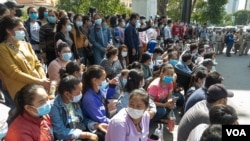Prime Minister Hun Sen on Wednesday launched a new government project to spend $25 million a month to support IDPoor households affected by the novel coronavirus pandemic.
The program will facilitate cash transfers to households identified by the government as part of the Identification of Poor Households Program, often referred to as IDPoor. The prime minister said around 560,000 families will be the beneficiaries of the program, which he said was funded by the state budget and was only a temporary measure.
“This is not the state feeding people. But it is huge social assistance,” said Hun Sen, who was speaking at the Peace Palace in Phnom Penh. “This is a responsibility of a poor state, but the poor state is still trying to help the poor.”
He said vulnerable and poor households would not be allowed to starve by his government, which he reminded the audience was run by the Cambodian People’s Party. He said such support would continue if economic distress from the COVID-19 pandemic persisted, but asked people to find jobs to support themselves.
The prime minister’s request to find jobs comes amid one of Cambodia’s worst economic slowdowns in nearly 30 years. The Asian Development Bank projected the economy will shrink 5.5 percent this year, and the World Bank estimates growth will register negative 2.9 percent, under its worst-case scenario.
The IDPoor program has been used to identify poor households, regularly update their progress, and use this data to target services and assistance. Households are identified using multiple criteria, such as land ownership, potential earning members, size of households, and possession of motorcycles or agricultural equipment.
Before the cash transfer scheme, IDPoor households were only provided free healthcare from the state. The program’s database is also used by other donors to target their assistance.
According to the program documents, rural IDPoor households will get 80,000 riels, around $20, for each family, with each family member getting $6 for “very poor” families, who are classified IDPoor1.
For IDPoor households on the outskirts of Phnom Penh, a family will get around $30, with each family member given an additional $10 for IDPoor1 families. In Phnom Penh, families will receive $30, with IDPoor1 family members getting an additional $13 each.
“Those who have more children will get more. Those will have old people, they will get more as well,” Hun Sen said at the launch event.
The government is also providing garment and tourism workers around $40, but has not extended the assistance to other worker sectors.
In a press release on Wednesday, the Australian and German embassy in Phnom Penh said they support the program as “historic cash transfer for poor households.”
“We are proud of our longstanding support for the Ministry of Planning’s Identification of Poor Households (IDPoor) Program, which will enable the implementation of this important initiative,” read the joint release.
The IDPoor database is updated regularly and currently, 560,000 households, around 2.3 million Cambodians, are eligible for the new cash transfer, according to the two embassies. The statement said that an additional 50,000 families have been added to the database as of June.
Chum Savorn, Sambo commune chief in Kratie province, said he had submitted 57 new families to be added to the existing 507 IDPoor families registered in 2018. Of the 57 families, 39 households had been granted IDPoor status, he said, with other families frequently requesting for assistance.
“Currently there are one or two families requesting [for IDPoor cards] a day and we interview them. Whether they are eligible or not depends on the system,” he added.
Treab Sarob, the 56-year-old villager in Siem Reap province, said her family was facing financial problems because three of her children had lost their jobs. Two worked as migrant workers in Thailand and one worked as a waitress in Siem Reap.
“I am now in desperate condition. Even a little money, it will help,” said the mother of 10 children, who need to pay microloan provider Hattha Kaksekar around $250 a month to pay back a loan.
“I depend on my children’s incomes and now they don’t have work; it is very difficult,” she said.
San Chey, executive director at the Affiliated Network for Social Accountability, urged the government to thoroughly study the economic effects of the pandemic on the citizenry so that it could accurately identify vulnerable households and support them.
“[Authorities] should find out the vulnerable victims of COVID-19 who don’t have the card to make sure that they have the opportunity to get equal benefits from the government,” he said.







